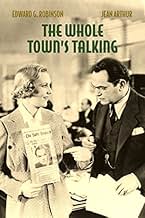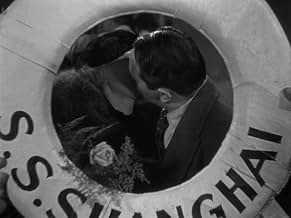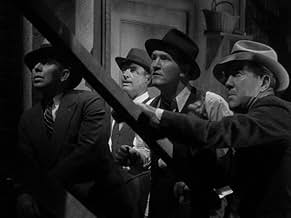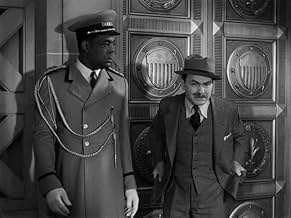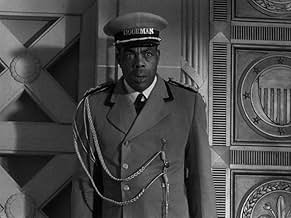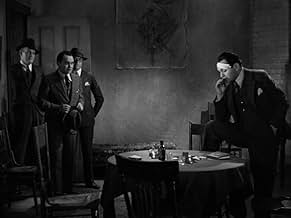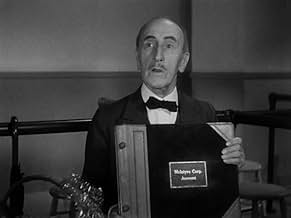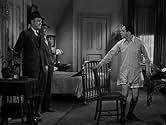IMDb RATING
7.3/10
3.6K
YOUR RATING
A meek milquetoast clerk is mistaken for public enemy N° 1, and the notorious killer takes advantage of the situation.A meek milquetoast clerk is mistaken for public enemy N° 1, and the notorious killer takes advantage of the situation.A meek milquetoast clerk is mistaken for public enemy N° 1, and the notorious killer takes advantage of the situation.
- Director
- Writers
- Stars
Harry Abrahams
- Convict
- (uncredited)
Ernie Adams
- Reporter
- (uncredited)
Carmen Andre
- Clerk
- (uncredited)
Chester A. Bachman
- Policeman
- (uncredited)
Eddie Baker
- Policeman
- (uncredited)
Lucille Ball
- Bank Employee
- (uncredited)
H. Barnum
- Undetermined Secondary Role
- (uncredited)
George Barton
- Policeman
- (uncredited)
- Director
- Writers
- All cast & crew
- Production, box office & more at IMDbPro
Featured reviews
Edward G. Robinson acted two roles in this movie and did a great job with both of them. He played the meek clerk and the tough gangster equally well.
This is a comedy, so one expects a happy ending; still, I couldn't tell how the plot was going to turn to make this work out well. Even ten minutes before the end I was still wondering.
This comedy is very well worth seeing for the acting by Robinson, the great character actors, and Jean Arthur in the role that Katz' Film Encyclopedia says was the first to show that she had comedic range. The film is directed by John Ford, and is rather uncharacteristic of the type of film he usually did.
This is a comedy, so one expects a happy ending; still, I couldn't tell how the plot was going to turn to make this work out well. Even ten minutes before the end I was still wondering.
This comedy is very well worth seeing for the acting by Robinson, the great character actors, and Jean Arthur in the role that Katz' Film Encyclopedia says was the first to show that she had comedic range. The film is directed by John Ford, and is rather uncharacteristic of the type of film he usually did.
Whole Town's Talking, The (1935)
*** (out of 4)
A timid, shy and all around weak store clerk (Edward G. Robinson) gets mistaken for a harden gangster (Robinson) but his new fame allows him to store writing a column in a newspaper about how gangster are weak without their guns. Soon the gangster shows up wanting more than just a little help. As a comedy this movie is a real masterpiece but as a drama, the final thirty-minutes or so really bring down a lot of the great moments. While watching this Columbia movie you can't help but wonder if this was originally meant to be directed by Frank Capra as it has his screenwriters and the small town story certainly seems like something you'd get from a Capra and not someone like Ford. To his credit, Ford does a great job with the comedy and really delivers one of the funniest movies of the 1930's. The problem happens in the third act when it really turns to too much of a gangster film and the laughs are pretty much forgotten. What holds both sides together is the terrific performance by Robinson. The way he plays the timid clerk is just downright hilarious and this includes a masterfully acted interrogation sequence where Robinson is nearly brought to tears because he's so scared. Seeing a tough guy like Robinson acting scared was just hilarious and one actually starts to feel sorry for the guy because it appears he's about to die. Robinson is also great in his second role as the gangster as he's as tough as ever and does manage to come off quite demanding and threatening. Jean Arthur is wonderful as well and adds many great comic scenes including her own interrogation where she keeps admitting to crimes that she has nothing to do with or even knows about. Arthur Hohl, Arthur Byron, Wallace Ford and Donald Meek round out the supporting cast. You can even see Joe Sawyer playing one of Robinson's goons. Again, I didn't care for the final act of the film as the comedy starts to not happen but that doesn't take away from everything at the start of the movie. Robinson has never gotten the credit he deserves as an actual actor, which is a real shame but this film allows for both sides of him to be highlighted and to great effect.
*** (out of 4)
A timid, shy and all around weak store clerk (Edward G. Robinson) gets mistaken for a harden gangster (Robinson) but his new fame allows him to store writing a column in a newspaper about how gangster are weak without their guns. Soon the gangster shows up wanting more than just a little help. As a comedy this movie is a real masterpiece but as a drama, the final thirty-minutes or so really bring down a lot of the great moments. While watching this Columbia movie you can't help but wonder if this was originally meant to be directed by Frank Capra as it has his screenwriters and the small town story certainly seems like something you'd get from a Capra and not someone like Ford. To his credit, Ford does a great job with the comedy and really delivers one of the funniest movies of the 1930's. The problem happens in the third act when it really turns to too much of a gangster film and the laughs are pretty much forgotten. What holds both sides together is the terrific performance by Robinson. The way he plays the timid clerk is just downright hilarious and this includes a masterfully acted interrogation sequence where Robinson is nearly brought to tears because he's so scared. Seeing a tough guy like Robinson acting scared was just hilarious and one actually starts to feel sorry for the guy because it appears he's about to die. Robinson is also great in his second role as the gangster as he's as tough as ever and does manage to come off quite demanding and threatening. Jean Arthur is wonderful as well and adds many great comic scenes including her own interrogation where she keeps admitting to crimes that she has nothing to do with or even knows about. Arthur Hohl, Arthur Byron, Wallace Ford and Donald Meek round out the supporting cast. You can even see Joe Sawyer playing one of Robinson's goons. Again, I didn't care for the final act of the film as the comedy starts to not happen but that doesn't take away from everything at the start of the movie. Robinson has never gotten the credit he deserves as an actual actor, which is a real shame but this film allows for both sides of him to be highlighted and to great effect.
Here Robinson plays the role of a mild-mannered bookkeeper, that of a body double in the person of a murderous gangster on the run - Killer Mannion, and he also effectively plays two other roles - that of the bookkeeper pretending to be the gangster, and the gangster pretending to be the bookkeeper. This could get very confusing, especially in the case of the latter two roles, but as the viewer you will be pretty sure you know who you're looking at by the circumstances. However, you'll still be bowled over by the subtlety of Robinson's performance - I know I was.
Jean Arthur plays Jones' (Robinson's) would-be girlfriend. She works in the same place as Jones, but longs for more than a hum-drum existence. When Jones tells her his hopes and dreams of being a writer and traveling to exotic places, she encourages him, and seems to see what he could be even if Jones doesn't quite see it yet. Arthur has what amounts to one of the funniest scenes in the movie, and there are many candidates. When the police first pick up and arrest Jones, believing him to be Mannion, they pick up Arthur too, thinking that she is his "gun moll". She has some fun with this and starts using gangster slang and mannerisms and confessing that Mannion committed every crime that the police ask her about.
One of my favorite supporting players of the 30's shows up here too - Ed Brophy, who was an assistant director over at MGM until Buster Keaton put him into a small but important role in "The Cameraman" in 1928. Once sound came in Brophy was perfect for playing supporting Runyonesque parts. Here Brophy plays an associate of Killer Mannion who is picked up by the police and makes a deal, promising to put the finger on Mannion. In return the police have to keep him safe in jail until Mannion is picked up. Brophy's character is brave whenever he thinks Manion has been captured and a blubbering coward whenever he realizes Mannion is still free.
Highly recommended as a great screwball comedy that shows the versatility of not only Edward G. Robinson, but of director John Ford.
Jean Arthur plays Jones' (Robinson's) would-be girlfriend. She works in the same place as Jones, but longs for more than a hum-drum existence. When Jones tells her his hopes and dreams of being a writer and traveling to exotic places, she encourages him, and seems to see what he could be even if Jones doesn't quite see it yet. Arthur has what amounts to one of the funniest scenes in the movie, and there are many candidates. When the police first pick up and arrest Jones, believing him to be Mannion, they pick up Arthur too, thinking that she is his "gun moll". She has some fun with this and starts using gangster slang and mannerisms and confessing that Mannion committed every crime that the police ask her about.
One of my favorite supporting players of the 30's shows up here too - Ed Brophy, who was an assistant director over at MGM until Buster Keaton put him into a small but important role in "The Cameraman" in 1928. Once sound came in Brophy was perfect for playing supporting Runyonesque parts. Here Brophy plays an associate of Killer Mannion who is picked up by the police and makes a deal, promising to put the finger on Mannion. In return the police have to keep him safe in jail until Mannion is picked up. Brophy's character is brave whenever he thinks Manion has been captured and a blubbering coward whenever he realizes Mannion is still free.
Highly recommended as a great screwball comedy that shows the versatility of not only Edward G. Robinson, but of director John Ford.
I don't think there's anyone who's ever seen The Whole Town's Talking and doesn't believe this was a film intended for Frank Capra. The mere fact that the screenplay was co-written by Robert Riskin who won an Oscar together with Capra for It Happened One Night the year before should give ample indication. If Capra had a choice between this and Broadway Bill he chose wrong.
Although this kind of comedy is not usually what is found in John Ford films, Ford does OK by it. I don't think he ever directed again anything that could be remotely classified as screwball comedy.
Edward G. Robinson who would make his second and last appearance in a Ford film 34 years later in Cheyenne Autumn, plays a dual role. He plays Killer Mannion in the tradition he established as Little Caesar and also A.L. Jones a meek, mild mannered clerk a type Robinson would play later in Mr. Winkle Goes to War.
Mannion's escaped from prison and there's a manhunt on for him, similar to the kind that was on for John Dillinger a year earlier. The police will simply shoot to kill. Bad luck for a guy that looks like Mannion and worse luck when Mannion finds out about his doppleganger and tries to make use of him.
Robinson is fine in his dual performance, but the film was a milestone for Jean Arthur who plays Robinson's fellow employee and despite his being a milquetoast, she sees something in him. Up to this point Arthur had played a lot of ingénues and loyal wives to leading men. This is her first role in a screwball type comedy that she became known for, in fact what she's remembered for mostly. Of course a year later, Harry Cohn did team her with Frank Capra and they certainly made some cinematic history.
My favorite two supporting parts are Etienne Girardot as Robinson's officious little office manager and Donald Meek another milquetoast who originally mistakenly turns in the clerk as the gangster and stays on the 'case.'
Though he's not in his element John Ford serves a nice piece of entertainment.
Although this kind of comedy is not usually what is found in John Ford films, Ford does OK by it. I don't think he ever directed again anything that could be remotely classified as screwball comedy.
Edward G. Robinson who would make his second and last appearance in a Ford film 34 years later in Cheyenne Autumn, plays a dual role. He plays Killer Mannion in the tradition he established as Little Caesar and also A.L. Jones a meek, mild mannered clerk a type Robinson would play later in Mr. Winkle Goes to War.
Mannion's escaped from prison and there's a manhunt on for him, similar to the kind that was on for John Dillinger a year earlier. The police will simply shoot to kill. Bad luck for a guy that looks like Mannion and worse luck when Mannion finds out about his doppleganger and tries to make use of him.
Robinson is fine in his dual performance, but the film was a milestone for Jean Arthur who plays Robinson's fellow employee and despite his being a milquetoast, she sees something in him. Up to this point Arthur had played a lot of ingénues and loyal wives to leading men. This is her first role in a screwball type comedy that she became known for, in fact what she's remembered for mostly. Of course a year later, Harry Cohn did team her with Frank Capra and they certainly made some cinematic history.
My favorite two supporting parts are Etienne Girardot as Robinson's officious little office manager and Donald Meek another milquetoast who originally mistakenly turns in the clerk as the gangster and stays on the 'case.'
Though he's not in his element John Ford serves a nice piece of entertainment.
Highly enjoyable comedy about meek clerk Arthur Jones (Edward G. Robinson) who is a dead ringer for the most wanted criminal in the country, "Killer" Mannion. Robinson is wonderful in both roles. No matter how many gangster roles he played, he always managed to add something unique to each one. It may just be a mannerism or personality trait, but I feel he managed to distinguish his characters in so many similar movies more than Bogart or Cagney did. Jean Arthur is hilarious and likable as the street smart girl Jones is in love with. Donald Meek is great fun as a busybody who refuses to believe Jones isn't Mannion. It's a rare comedy from director John Ford but a good one.
Did you know
- TriviaThe $250.00 per week that Jones is to get for writing the article in this 1935 comedy translates to $4,999.23 per week in 2019 dollars.
- GoofsWhen Jonesy leaves his apartment in a rush he forgets to turn off the taps and his tub is (torrentially) overflowing. But when he returns from the police much later in the day there is no water anywhere.
- Quotes
Arthur Ferguson Jones: You know something, a woman is only a woman, but a good cigar is a smoke.
- ConnectionsEdited into Michael Jackson's This Is It (2009)
- How long is The Whole Town's Talking?Powered by Alexa
Details
- Runtime1 hour 33 minutes
- Color
- Aspect ratio
- 1.37 : 1
Contribute to this page
Suggest an edit or add missing content

Top Gap
By what name was Toute la ville en parle (1935) officially released in India in English?
Answer

